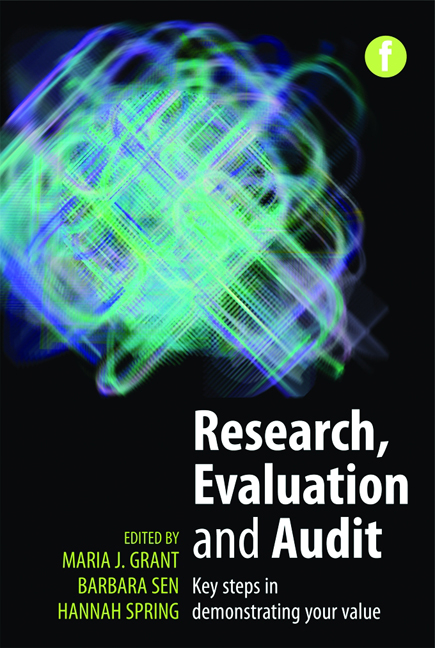Book contents
- Frontmatter
- Contents
- About the Editors
- Contributor
- Foreword
- Preface
- PART 1 GETTING STARTED
- 1 What are research, evaluation and audit?
- 2 Building confidence
- 3 Asking the right question
- 4 Writing your project plan
- 5 Ethics and best practice
- PART 2 DOING RESEARCH, EVALUATION AND AUDIT
- PART 3 IMPACT OF RESEARCH, EVALUATION AND AUDIT
- Closing remarks
- Index
1 - What are research, evaluation and audit?
from PART 1 - GETTING STARTED
Published online by Cambridge University Press: 08 June 2018
- Frontmatter
- Contents
- About the Editors
- Contributor
- Foreword
- Preface
- PART 1 GETTING STARTED
- 1 What are research, evaluation and audit?
- 2 Building confidence
- 3 Asking the right question
- 4 Writing your project plan
- 5 Ethics and best practice
- PART 2 DOING RESEARCH, EVALUATION AND AUDIT
- PART 3 IMPACT OF RESEARCH, EVALUATION AND AUDIT
- Closing remarks
- Index
Summary
‘I don't do research. I don't have the time. I am too busy with the day today running of the library. I do evaluations of my service to ensure that it meets the needs of my users, and that the journal providers give good value for money. But that's not research is it?’
‘I'm a practitioner not a researcher.’
‘I run a service, so have nothing to research.’
The existence of a workable definition of research is an important one, as a common barrier for becoming involved in research is a lack of understanding or misunderstanding of what research is.
Research is identified by French, Reynolds and Swain (2001) as the simple process of systematic enquiry and of finding out. Across the board, professional disciplines from industry, business, science and law to the arts and humanities, the definitions of research are essentially the same. For instance, in relation to business studies, Saunders et al. (2003) identify research as the undertaking of processes in a systematic way in order to find things out about business and management. Cameron and Price (2009, 4) define research as ‘any systematic attempt at collecting and interpreting data and evidence in order to inform thinking, decisions and/or actions in relation to an issue of interest to an organization and/or its stakeholders’. Elsewhere, the UK Department of Health (2005) defines research as ‘the attempt to derive generalisable new knowledge by addressing clearly defined questions with systematic and rigorous methods’.
Why is research important?
Research can demonstrate the relevance, value, impact and effectiveness of the day today business of library and information provision. As the above definitions imply, research provides us with the means of finding answers to questions. Supplementing your professional knowledge and experience, RycroftMalone et al. (2004) highlight ‘local’ data (gathered through audit) and customer experience and preferences (gathered through evaluation) as activities that you may use to investigate your day today practice – activities which can count as research.
The output from research, evaluation and audit are all appropriate in the information and library sector and can be carried out by people who would consider themselves to be either practitioners or academic researchers.
- Type
- Chapter
- Information
- Research, Evaluation and AuditKey steps in demonstrating your value, pp. 3 - 14Publisher: FacetPrint publication year: 2013



